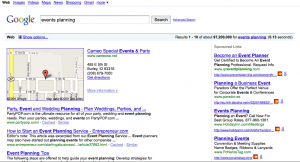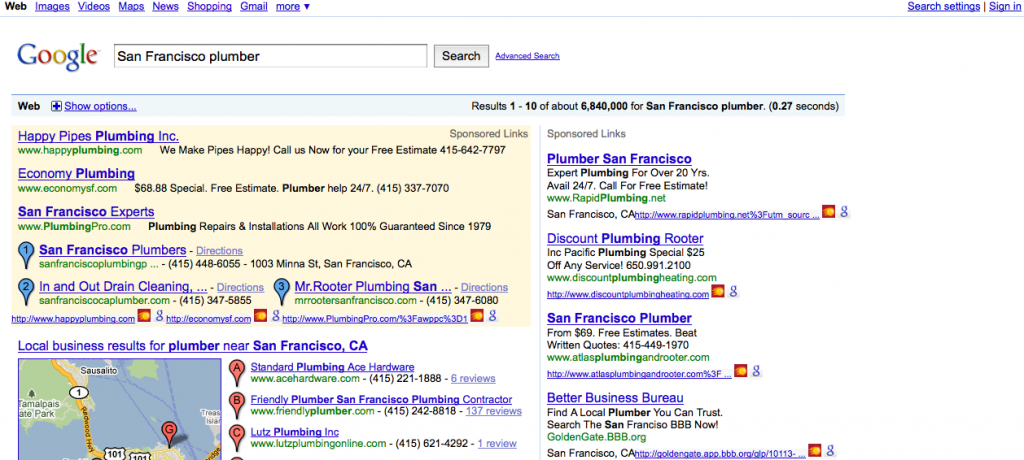I just read Aaron Wall’s post Excuse Me Where Did Google’s Organic Search Results Go? that seemed to spark a bit of conversation in the comment section. The article highlights the changes taking place on the SERPS, and gives great advice to organic seo’ers on future steps to take. The best part of the article (IMHO) is where Aaron states…
“In the past many SEOs have called organic search results the results on the left side of the page and the pay-per-click / AdWords results as the results on the right side of the page. As Google has grown more aggressive witht promoting vertical/universal search I think a better way of defining the portions of the search result page are ABOVE THE FOLD and BELOW THE FOLD.”
That couldn’t me more correct. Where organic search use to thrive, universal oneboxes continue to find their way on to the front page in the form of maps, news, videos, pictures, scholarly articles, etc. Because of this, traditional organic seo has lost a lot of real estate on the front page of the serps.
My number one question is….have the changes increased user experience? Overall, I think the answer is yes. On the part of local map results, it is much better to see a quick list of 7 businesses with reviews, address, and website information, than digging through organic search results looking for a recommended company. But, there are problems that will need to be addressed if the end goal is providing a user with the best choices. For instances, the authoritative one box…
This appeared when I did a search for “events planning” with no location specified. Now, this search query no longer produces a onebox, but during the time it did… anyone in my area doing a very broad keyword search was seeing a local business take up a very large amount of real estate on the front page of Google. Not so good. This is like asking your grandpa for the best restaurant in town….He’s gonna say “golden corral” and be dead wrong every time
Then we have the example of a local search in the San Fransisco, or San Diego market that is currently testing local business ads…
There are 10 ads visible, and 3 local business listings showing without scrolling down. Every one of the listings is very relevant to the search. By scrolling down, there is a list of 10 organic listings that range from small business websites to internet yellow pages. Only one of the organic listings shows a phone number in the title or description text, but all organic listings are relevant to the search. Which listings are better for the user in this case? Should organic listings be above map results? I think the answer would widely depend on if you make a living optimizing for adwords, local search, or organic listings.
The key is that with search queries displaying more than SEO/PPC results, search marketers need to be willing to understand ranking factors and practices of all fields. If my whole focus is google maps, what happens when “location + web design” doesn’t display a map result (happening all over today). Or, if all I do is PPC and now there are 3 local listing ads in my favorite spot. Most hard to imagine though, is what if I am an organic seo guru, and ads continue to move closer to natural results, maps start showing up above me, and 3 more paid spots push everything down 100 pixels because Google, Bing, Yahoo continue to find ways to make more money?
The question that search engines ask themselves everyday is, “what can we do to increase revenues while producing a better user experience, and continue to gain market share?” As a SEM, I personally need to understand the answers Search Engines are coming up with, and align my focus on path that is being taken, or fall behind and spend my time talking about the good ol’ days.

